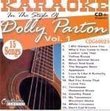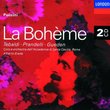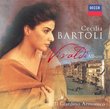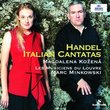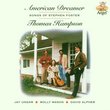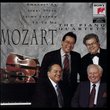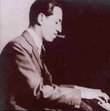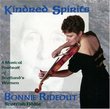| All Artists: Antonio Vivaldi, Europa Galante, Patrizia Ciofi Title: Vivaldi: Motets Members Wishing: 2 Total Copies: 0 Label: EMI Classics Release Date: 11/2/2004 Genres: Pop, Classical Styles: Vocal Pop, Opera & Classical Vocal, Chamber Music, Historical Periods, Baroque (c.1600-1750), Classical (c.1770-1830) Number of Discs: 1 SwapaCD Credits: 1 UPC: 724354570421 |
Search - Antonio Vivaldi, Europa Galante, Patrizia Ciofi :: Vivaldi: Motets
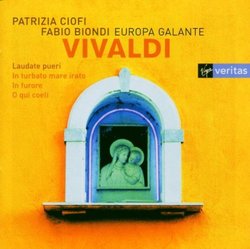 | Antonio Vivaldi, Europa Galante, Patrizia Ciofi Vivaldi: Motets Genres: Pop, Classical
These Motets prove that Vivaldi, although best known today for his instrumental works, composed for voice and instruments with equal mastery. Indeed, the orchestral writing closely resembles that of his concertos, complete... more » |
Larger Image |
CD DetailsSynopsis
Amazon.com These Motets prove that Vivaldi, although best known today for his instrumental works, composed for voice and instruments with equal mastery. Indeed, the orchestral writing closely resembles that of his concertos, complete with violin and cellos solos. The soprano engages in brilliant flights of coloratura and evocations of emotions from despair, torment, fear of God's wrath and horror of death to prayerful pleading, tenderness, serenity, and gratitude for God's mercy. The orchestra not only underlines these moods but depicts the turbulent sea, the raging storm, the Divine light. The first Motet, a hymn of praise set to Psalm 112, is essentially dramatic. Cast in a series of brief movements alternating minor and major, slow and fast, homophonic and contrapuntal, it abounds with beautiful, sustained devout melodies and bursts with rhythmic vitality. The other three Motets each feature two contrasting da capo arias--the returns freely embellished--separated by a recitative and culminating in a joyful, triumphant Alleluia. This results in a certain sameness of form, but as in the concertos, which have been unjustly accused of all sounding alike, the differences in texture, mood and expression create plenty of contrast and variety. The vocal writing is very difficult, especially in the florid repeats, at one point going up all the way to a high D (the orchestra is tuned a half-step down, or it would go even higher), so Patrizia Ciofi sometimes seems to struggle. Using a "white," vibratoless tone, she occasionally sounds a bit shrill. However, her intonation is impeccable, her breath control admirable, and she clearly feels at home in the style. The orchestra is excellent, both in the accompanying and solo sections. Vivaldi creates a real surprise by adding a trombone solo to one of the first Motet's fast movements. --Edith Eisler Similar CDs
Similarly Requested CDs |
CD ReviewsAbsolutely Stunning Brian D., Hodges | Boise, ID | 06/18/2005 (5 out of 5 stars) "this has quickly turned into my all-time favorite discs. i was already a huge fan of Fabio Biondi, but hadn't heard Patrizia Ciofi. wow--what a voice! she has an absolutely stunning voice and her navigation around Vivaldi's music is exemplary as well. it goes without saying that Biondi and the magnifico Europa Galante is more than up to the task, providing a bellissimo accompaniment to Ms. Ciofi. another top-notch disc from these fantastic performers. Bravo Tutti! i would love to hear more of Vivaldi's vocal works from these artists. favorite track: Sit nomen Domini [Largo] from Laudate pueri Dominium RV 600. unbelievably gorgeous movement and heart-wrenching. i could listen to it on repeat all day. Highly Recommended! do yourself a favor and purchase this CD. it is well worth it! " Another Vivaldi Triumph for Biondi With Ciofi His Muse Ed Uyeshima | San Francisco, CA USA | 03/29/2005 (5 out of 5 stars) "This is yet another perfectly sublime recording of Vivaldi's religious music for vocals and strings from violinist Fabio Biondi and his ensemble Europa Galante, a worthy successor to their wonderful 2002 recording of Vivaldi's "Stabat Mater/Nisi Dominus/Longe Mala" featuring the extraordinary countertenor David Daniels. This time Biondi has landed the considerable talents of soprano Patrizia Ciofi, whose energetic coloratura was most recently heard on the stylish "Handel Operatic Duets (Amor e gelosia)" disc with mezzo-soprano Joyce Di Donato and the splendid René Jacobs-produced recording of Mozart's "La Nozze di Figaro". It's worth noting that Daniels, Ciofi, Biondi and Europa Galante are teamed up on the upcoming recording of Vivaldi's "Bajazet". Even though this disc is subtitled "Motets", technically the first piece, "Laudate pueri Dominum," is not a motet but an extended psalm, and even more surprising is the fact that it is a lively, challenging 23-minute work consisting of ten diverse movements, all of which Ciofi tackles with great skill. Her fiery bravura is especially evident in the opening allegro and returns toward the end in a repeat of the same movement. This provides an effective contrast to her appropriately mournful tone on "Excelsus super omnes," where she is accompanied by a somber obbligato trombone, and the beautiful legato she displays on "Gloria Patri et Filio". Ciofi shows powerfully expressed fury on both "In furore giustissimae irae" and "In turbato mare irato", the opening arias of the second and third motets, without sacrificing the inherent warmth of her voice. In contrast, she sounds joyful with great abandon on the opening aria of the last motet, "O qui coeli terraeque serenitas". The largos, "Tunc meus fletus" from "In furore..." and "Rosa quae moritur" from "O qui coeli..." both contain a melting quality that is at once inspirational and passionate, The larghetto "Resplende, bella" from "In turbato..." is arguably the disc's high point, a sensitive performance that shows off Ciofi's amazing breath control and dramatic acumen. This is lovely, hypnotic work, almost too beautiful for the deeply religious lyrics performed, with stellar performances all around." With music like this, going to church in the 1700's rocked! Dennis Figueroa | Orange County, CA | 11/28/2006 (5 out of 5 stars) "Just as I think that Vivaldi has reached an insuperable level of inspiration with an aria or concerto, and nothing else can beat it or he can't exceed it, I am proven wrong. Case in point is the larghetto aria "Resplende bella". This aria actually sounds like a requiem, very solemn, emotional on the brink of death and mourning, masterly executed by Ciofi, and with the perfect vocal affections to drench and sadden the heart. If anything, the aria should be renamed "Mortis Horrores" after its leading mantra and most dramatic point reminiscent of a ritual procession. At some point, the music defies the baroque and sounds like nothing written almost three hundred years ago. Ciofi is phenomenal. Biondi complements her perfectly with the right punctuation and texture. It seems that everything or anything he plays can't be rivaled. Though I got this CD for "In Furore Giustissimae Irae", was much more pleasantly surprised by the rest of musical repertoire. Ciofi commands the strength and deliverance in the very sweeping vocal runs of the Alleluias, and the allegros from "In turbato mare irato" and " In Furore Giustissimae Irae". In the latter, Ciofi astounds with her ability to carry the same orchestral rhythm at full coloratura and note continuity. Wow! Even the recitativos are not to be missed or skipped. They really belong and find their musical right to be."
|

 Track Listings (22) - Disc #1
Track Listings (22) - Disc #1
